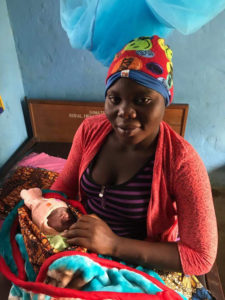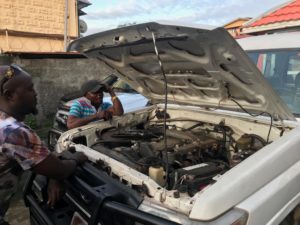Crossing terrain to drop off mother admitted into the Mbao-mi Mothers’ Home to return home with her newborn.
132. That is the average number of trips RHCI’s truck takes each month. The Toyota truck is one of RHCI’s most valuable assets. Each trip the truck takes, is one less trip a laboring mother has to walk to the health center for safe delivery. Each trip driven, is one less trip a critically ill child has to walk or be carried to receive medical care. And it’s one more trip to deliver valuable medical supplies, equipment, and medicine to local health centers.

Mother and Baby at Mbao-mi Mothers’ Home
Last month, a commercial truck hit RHCI’s valuable truck, leaving it out of operation for the rest of the month. Results of the hit meant possibly not being able to make 132 lifesaving trips. Without the truck, RHCI was able to make it by using the RHCI motorbike and founder, Alice Karpeh’s vehicle. However, this is not sustainable for RHCI’s programs to continue.
Knowing car troubles are inevitable, RHCI has insurance, which will help cover most of the costs of repair. Recognizing that 132 trips could again be lost, the need for a second vehicle is more prominent than ever. RHCI has aimed to raise funds for a second truck this year. The second truck would be a part of an expansion plan into neighboring villages, to extend the reach of care to more lives.

Truck after the hit
On the few existing roads of the Tikonko Chiefdom, where RHCI’s program outreach take place, the terrain is treacherous. A sturdy 4 wheel drive truck that can handle the unexpected roadblocks and flooding is crucial. Mothers from the Mbao-mi Mothers’ Home are thankful to have the truck to transport them and their newborns back to their rural villages. In the event they need obstetrical care, they are thankful to have the truck to transport them to the Bo Hospital. Before RCHI’s truck, mothers had to walk for hours to return home with their newborn, days after labor. Having the RHCI truck for transportation, saves vital hours to reach the children’s hospital for the care of a critically ill child.
RHCI is thankful for donations toward a second truck and for recognizing that 132 trips a month is 132 lives impacted.

